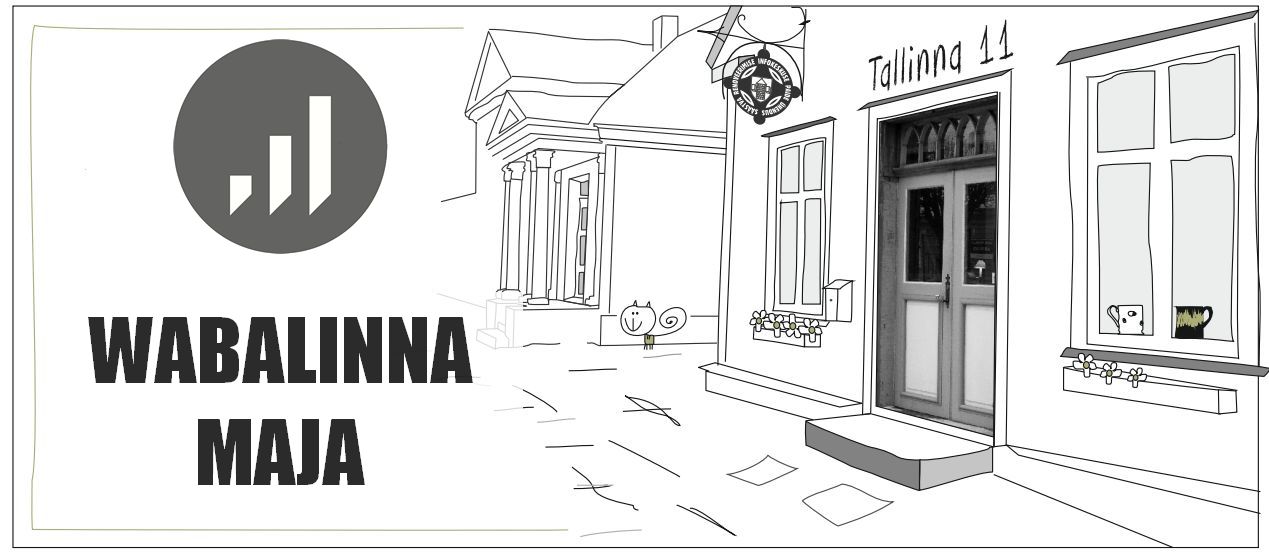Wabalinn could be translated to English as Freetown. You can find us in Freetown House (Wabalinna maja in Estonian) in Paide at 11 Tallinna street. The house has also been known as Paide Community Centre (Paide kogukonnakeskus in Estonian) or as the house of Paide SRIK.
Wabalinn unites different NGO-s and initiatives that aim on the development of our urban environment by volunteers. The W-sign converges several initiatives by name - Association Weissenstein, Walge Gallery, Welopark, Wabakino (or FreeCinema), Wabakohvik (or FreeCafe) etc. Besides that you can find here the Centre of Volunteers in Järva County, local handicraft workshop, local newspaper KoosOlek and local money P.A.I.
In Freetown House we offer an environment where local citizens can meet, start and do things together so that we all have better and happier life in our nice town.
The idea of Wabalinn is simple - the urban environment in our town is mostly desgned by its citizens and much can be done by volunteer actions. Much of community actions in Paide have started from the Old Town movement - the desire to develop one of the potentially best areas for living here. Hence the W-sign - historical Paide as Weissenstein.
In 2010 Association Weissenstein organized the project "Wabalinn Paide" that resulted in citizens' own visions about designing the town environment. Then also emerged the moto for Wabalinn - "kogukondlik ja kestlik" that could be translated as "communal and sustainable". Communal means putting local community interests first like for example prefering the products of local small businesses or parks for locals rather than parking lots for visitors. The example for the other keyword "sustainable" would be fixing existing instead of building new.
The idea of Wabalinn is a bit influenced by the "Transition Towns" movement spreading in the world, but also by several other ideas from different communities.
Freetown House is actually a complex of two historical buildings in the centre of the town - one small wooden house and other quite large red-brick warehouse. Both were built in 1907 by local businessman Johanson. In last 10-15 years the buildings were almost empty and started to decay. Local youth center used the smaller house and renovated it, unfortunately using wrong materials not suitabel to old town.
In 2007 Paide SRIK started to use two rooms in the wooden house. Later we initiated many projects named above and started gradually use all the complex. Many repair- and renovation works are done with the help of local volunteers, but input from local municipality is also very remarkable (the buildings belongs to Paide town). Our aim is to build up strong and viable town-community which follows the ideas of sustainability and is able to have more independent local economy and cultural activity.
In Freetown House we wish to create cosy and creative environment that is nice for just being there, but where also work is done. It is a place where you can just hang around, meet people, telework or come to carry out your ideas. In our lobby there is the FreeCafe and a little library where you can listen to music, use wifi and printer if needed. In the upstairs gallery we also have workshops, seminars, conferences. You can rent our rooms for small events if needed. Some pictures of the house can be found in the Estonian website of Wabalinna maja.
Wabalinna Stuudio (or Freetown Studio) is a weekly radio broadcast that is recorded in Wabalinna maja.
It is made by Rainer Eidemiller, Kaido Kirikmäe and Leho Rubis who talk about civil initiatives, music and arts both in Wabalinna maja and in other places in Estonia and all over the world.
You can listen to older broadcasts in the Estonian website of Wabalinna stuudio.
Our Estonian website is here: http://wabalinn.weissenstein.ee/
Paide Wabaks! - Free Paide!






.jpg)





